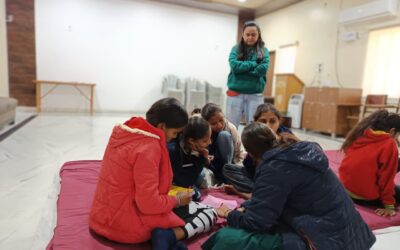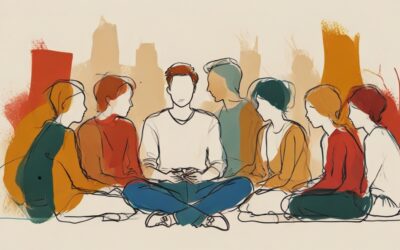It was a balmy summer evening when I met Kumkum Devi working on a piece of cloth doing intricate embroidery. She looked tired but her eyes were gleaming with satisfaction of design coming out as she wanted it. The colorful threads spooled around her as she deftly moved the needle in patterns that took me to my childhood. My mother used to embroider these same colourful stitch patterns on old fabrics to give them new life. As a child, I didn’t understand the importance of these traditional embroideries and never took an interest in learning them.
Being an adult, I realize the value these handcrafted work carry and how important it is to preserve them. The art I am talking about is Sujni Art common to Bihar, Jharkhand, Chhattisgarh and parts of Uttar Pradesh.
Origin Of Sujni Art
Sujni art is native to the state of Bihar where it originated in a small village in district Muzaffarpur. Traditionally, women stitched together patches of old clothes to make swaddles for newborns. The quilt was embellished with a simple running stitch called Sujni. Women still make it for their children or grandchildren weaving every thread with love in anticipation of the new life. Gradually women started using motifs of fish, and other sacred animals symbolising fertility. Today, artisans produce bedsheets, dupattas, laptop bags, wall hangings using Sujni Art.
Each piece of Sujni Art is a laborious piece of love. First select the fabric, which can be anything from cotton, silk to fine muslin. The design is drawn on the fabric using freehand drawing or a stencil with chalk. Next, embroider the design using different colored threads and stitches like chain stitch and back stitch. The embroidery done entirely by hand is a laborious work taking 5 to 10 days on a bedsheet or dupatta. Bags or small sized fabrics are ready in a day. After embroidery is done, the cloth is washed and ironed ready for use or display.
When Women Dream
I crossed paths with this art again recently in my fellowship in Dalsinghsarai and found a group of women who are rediscovering their identity as artisans through this art. Swasti Seva Samiti (SSS) is an organization based in Dalsingsarai, working with a group of women artisans who practice Sujni craft. In 2014, founder Ms Anita Chaudhary (founder) realised women had the skills but didn’t had the opportunity to showcase their skillset to the world. Her motive was to fill the gap between this traditional art and market demands for the final product. Currently, 26 women are associated with the organization. Various exhibitions in Patna have showcased their work earning them appreciation and has found buyers as well.

Rediscovering Identity
I met some of the women associated with SSS on a rainy evening. Over a cup of tea, these smiling women shared their stories of discovering the importance of their skills. Reeta Devi, one of the woman part of SSS since its beginning in 2016. She learned the art from her mother as a child. As a young girl, she couldn’t go outside and had to learn all the different embroideries her mom did at home. Her mother-in- law is the one who took her to the first meeting of the organisation and there has been no looking back ever since. She says,
I discovered that this is not just a hobby but a handicraft form which made me feel I can do something for myself

Fulfilling Dreams Through Sujni Art
Suman, one of the newest member of the organisation shared her story. She got married at the young age of 14 while dreaming of a bright future with education. As a girl, she couldn’t leave her house at her parents place. Her dreams were crushed and she was given a lot of responsibilities at a very young age. SSS has given her a chance to chase the dreams that were snatched away from her. “I struggled to study or work, but when exhibitions recognise our work and people appreciate my art, I feel like life has come full circle.”

Unlearning Traditions
Sujni embroidery is dying like many other art forms of our country as there are few takers. From my conversation with women artisans at SSS, I realised there are many reasons the art has got few takers. In villages, no one wants to buy them as almost everyone knows the art. Marketing and awareness is another reason that only few people know about the art form. There are few occasions like festivals when orders come otherwise the sale is lean throughout the year at the organisation.
Another reason that art is dying because younger generations don’t want to learn this art form. The current generation invests in education and aims to settle into well-paying jobs
Threads Of Love
Mothers gift their daughters Sujni art on their wedding, which includes bedsheets, pillow covers, bags, and more. A mother sews love and aspirations for her child from the moment they are born till their wedding. Every mother wraps each stitch with love and blessings for her child, which is the origin of this art. The journey of a mother making a cozy blanket for baby to present times when these women are marking their identity as artisans. This art has come a long way from its origin but its essence remains the same.
For the women at Swasti Sewa Samiti, their skills and art has earned them an identity as artisans. This act of empowerment came when their art went outside the confines of four walls of their homes. This leap of faith reflects in every piece of art they make with same finesse, stitched with lots of love. Even though many people appreciate this art, there are only few takers. It’s time that we recognise the importance of local arts and prevent another glorious art from taking its last breath.
P.S. You can buy this art and put a smile on these women’s faces. Contact – swastisevasamitimahilaekai@gmail.com, 7631626123




0 Comments